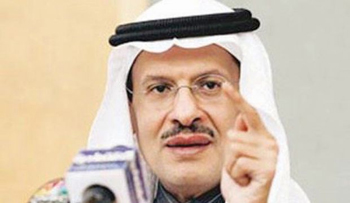Jeddah, Nov 10: Long-term oil market fundamentals remain robust but prolonged low prices could threaten security of supply and pave the way for a price spike, warned Saudi Arabia on Monday.

He said current sharp oil price fluctuations are very harmful to oil producers, consumers and workers alike.
Just like high oil prices can’t last, a prolonged period of low prices is “also unsustainable, as it will induce large investment cuts and reduce the resilience of the oil industry, undermining the future security of supply and setting the scene for another sharp price rise,” said the prince.
“As a responsible and reliable producer with long-term horizon, the Kingdom is committed to continuing to invest in its oil and gas sector, despite the drop in the oil price,” he said.
Prince Abdul Aziz pointed out: “Despite all the macroeconomic uncertainties engulfing the global economy, oil demand continues to grow at a robust pace and set to increase by 1.5 million bpd in 2015, the strongest growth seen in the past few years. This is in contrast to the early 1980s where global oil consumption fell between 1980 and 1984 by more than 2.3 million bpd.”
In order to meet the expected increase in demand, the world needs all sources of energy, including oil, gas, renewables, nuclear, and solar, he said.
The Kingdom has always been of the view that there are plenty of resources to meet the projected increase in demand.
“After three years of positive growth, non-OPEC supply is expected to fall in 2016; only one year after the deep cuts in investment,” said Prince Abdul Aziz.
He said Saudi Arabia plays, and will continue to play, a proactive role in stabilizing oil market conditions by building on its close relationship and ongoing cooperation with both producers and consumers, and through its effective and constructive engagement in OPEC and The International Energy Forum.




Comments
Add new comment